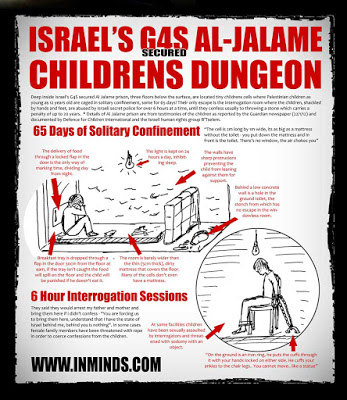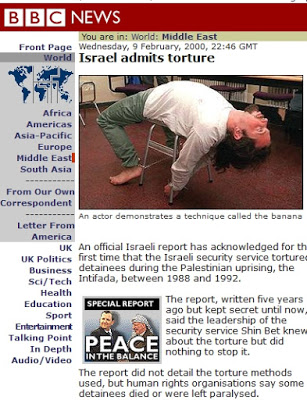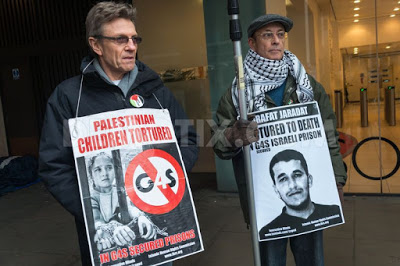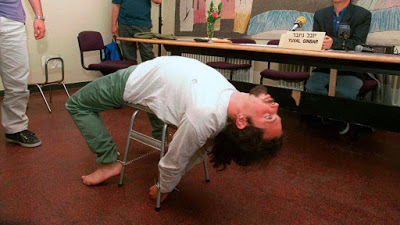 |
| The Banana Position – A Torture Stress Position Used by Israel |
This
is a shocking report from Electronic Intifada.
Not only does the PA torture most of those arrested by its Preventive
Security Forces but it also hands those it has tortured onto the Israeli military
in order that they can be detained and tortured again.
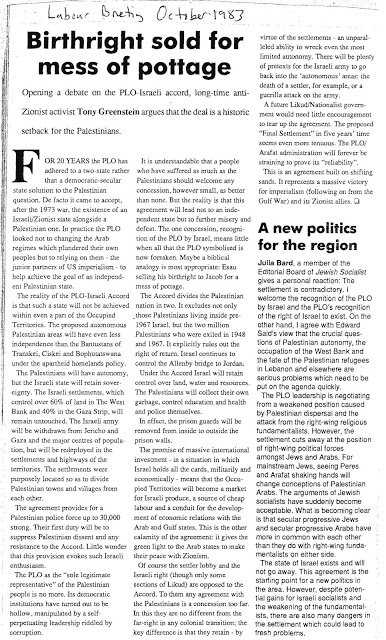 |
| Article on the Oslo Accords October 1993 predicting the collaboration of the Palestinian security forces |
know that Quisling-in-Chief Mahmoud Abbas has defended the ‘sacred’ nature of
the PA’s co-operation with the Israeli military. Abbas vows to uphold ‘sacred’ security coordination with Israel
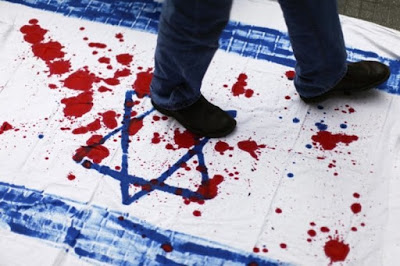 |
| Israeli doctors are an essential part of the torture system |
also know that Abbas’s security forces have done their best to quell the latest
uprising against the Israeli occupation.
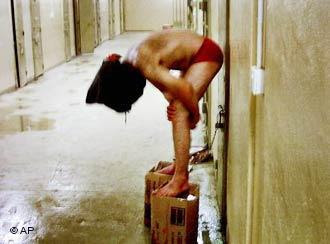 |
| Stress positions used by Israel and Palestinian security forces |
The Times of Israel reported that:
‘Palestinian Authority President Mahmoud Abbas told the leaders of his Fatah
movement’s Tanzim militant wing Sunday to immediately work to calm spiraling
tensions with Israel….. Abbas has said several times he is working to calm
tensions and doesn’t want to see violent unrest spread, though Israeli
officials accuse him of inciting a spate of terror attacks and violent West
Bank clashes.
Abbas has also spoken in recent days to Fatah leaders
who have led calls for more terror attacks against Israelis, including Mahmoud
al-Alul and Sultan Abu al-Inin, and demanded that they cease making statements
in support of such attacks.’
Stop urging violence, Abbas tells Fatah militant leaders
to Israel Today, in an interview with Defence News, Major General Majid
Faraj, the head of Palestinian
intelligence, said that in the previous three months the PNA security forces
prevented approximately 200 attacks against Israelis and detained about 100 ‘potential
terrorists and confiscated their weapons’.
clear that the PA and its security forces operate as a sub-contracted arm of Israel’s
military. It does the dirty work for the
Israeli armed forces. In October 1993 I
wrote, in an article Birthright sold for
a mess of potage for London Labour Briefing [which students of the Bible
and the story of Jacob and Esau will recognise!) which criticised the then almost universally
applauded Oslo Accords: (see)
‘The agreement
provides for a Palestinian police force of up to 30,000 strong. Their first duty will be to suppress Palestinian
dissent and any resistance to the Accord.
Little wonder that this provision evokes such Israeli enthusiasm…. This agreement
will lead, not to an independent state but to further misery and defeat… In
effect the prison guards will be removed from inside to outside the prison
walls… There will be plenty of pretexts for the Israeli army to go back into
the autonomous areas…’
how accurate this article is in its predictions. Every single prediction has come true. Yet I didn’t have a crystal ball. Fortune telling is not my expertise. A simple Marxist analysis of what the Oslo
Accords represented, stripped of the nationalist rhetoric and a concrete analysis of the situation of the Palestinians resulted in an article that
predicted, quite correctly, that the Oslo agreement represented a ‘massive
victory for imperialism’.
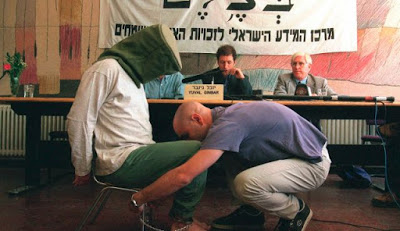 |
| Israeli actor in torture session |
that victory by first of all cutting our links with the PA and not giving it
any
links with the Palestinian mission in London led by Professor Hassasian. Those with any illusions in this mission
should think carefully. Despite his
rabble rousing speeches, the London mission is part and
parcel of the PA’s operation.
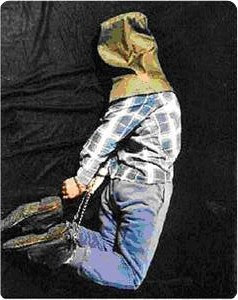 |
| Another Israeli stress position that Palestinian forces also use |
death sentence (later commuted to 800 lashes and 8 years in prison) for Palestinian
poet Ashraf Fayadh Unsurprisingly I heard nothing by way of a reply.
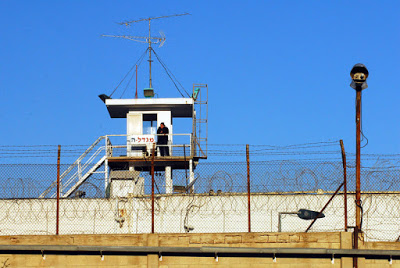 |
| Shikma – Israeli Torture and Detention Centre |
PA collaborates with Israel’s torture agency
prison in Ashkelon is the site of routine torture of Palestinians by Israeli
interrogators, according to a new report.
Ben-Ari Chameleons Eye
prisoners are being held in painful positions for up to 35 hours, according to
a new report.
Israel Security Agency, known as the Shin Bet, is confining
detainees to filthy cells smaller than the size of an adult body stretched out,
the report also reveals.
by the Israeli human rights organizations HaMoked and B’Tselem, the report
focuses on the Shikma
interrogation center in Ashkelon,
a city in present-day Israel.
is based on 116 affidavits from Palestinian “security prisoners,” most of whom
were still under detention when they testified.
detainees – the majority men under the age of 25 from the Hebron area of the
occupied West Bank – recalled their arrest, transfer, interrogation and holding
conditions to attorneys while sitting behind a glass partition, with their legs
tied to the chair and under the supervision of a prison guard.
report is a product of a three-year investigation. More than half of those
interviewed reported they were forbidden to meet a lawyer or denied access to
the International
Committee of the Red Cross for all or part of their time at Shikma.
is despite how Israel’s own prison rules stipulate that a prisoner must be
allowed access to the Red Cross within two weeks of detention.
report also highlights the collaboration between the Palestinian Authority
Preventive Security force and Shin Bet.
of the detainees interviewed were arrested and interrogated by the Palestinian
Authority before being arrested by Israel.
of those were arrested by Israel less than a month after being released by the
PA, and usually interrogated about the same matters.
Awawdeh, 21, was detained by the PA for 70 days, during which he was physically
and mentally tortured. Just a week after he was released, Awawdeh was arrested
by Israel. When he arrived at Shikma, his interrogator showed him his file from
the PA and said, “Here’s your file. It’s all ready. Do you want to add anything
and save us some time?”
report accuses the doctors at the detention facility of complicity in the
torture program. One 18-year-old high school student had a swollen face because
of the beating he received by soldiers on the way to Shikma.
the student also had epilepsy, mental health issues and a head injury resulting
from being hit by shrapnel two years earlier, a doctor at the center pronounced
him to be healthy.
student was not provided with regular medication during his 44 days at the
center. After losing consciousness while being tied to a chair on one occasion,
a doctor gave him painkillers and his interrogation continued.
report notes that the ill-treatment at Shikma is far from isolated. It makes
clear that the interrogation system followed in the center was shaped by the
Israeli state and describes cruel and degrading treatment as “inherent” to the
Shin Bet’s policies.
justice ministry has responded to the report dismissively, charging the authors
with “distorting the existing reality” to advance an agenda on the basis of
“several isolated incidents.”
in fact the interrogation methods described in the report bear a striking
resemblance to the methods the Israeli government and judiciary have already sanctioned.
1987, the state-appointed Landau Commission
reviewed the Shin Bet’s interrogation methods. Headed by Moshe Landau, a former
president of the Israeli high court, the commission concluded that both
physical and psychological “pressure” were necessary to defend Israel against
“hostile terrorist activity.”
according to the Landau Commission, included essentially any activity related
to Palestinian nationalism.
unpublished annex to the commission’s report listed interrogation tactics that
it deemed acceptable. That list has been approved by the
Israeli state.
1999, Israel’s high court ostensibly banned the Shin Bet from using the list of
Landau-approved techniques, but left the option available in cases of “ticking
bombs.” This exception was regularly invoked after the second intifada broke
out only two years later.
decision gave Israel a legal framework within which it could torture that the
United States would later replicate.
to the US Senate report on torture published in 2014, the
CIA argued in 2001 that “the Israeli example” could be used “as a possible
basis for arguing that torture was necessary to prevent imminent, significant,
physical harm to persons, where there is no other available means to prevent
the harm.”
torture and abuse has never been reserved for “ticking bombs.”
Misk, a 24-year-old from Hebron, was arrested while working in Tel Aviv without a
permit to be in Israel.
banged my head against the wall several times … At least three of them sat on
top of me, beating the hell out of me, punching and hitting my head and chest
with clubs,” Misk said.
new report demonstrates that physical violence begins immediately upon arrest,
which frequently occurs in the middle of the night.
being in bed with your wife and soldiers coming in just like that. I woke up to
see a soldier in front of me, pointing a gun at me,” Ashraf Asfur, a
34-year-old student and farmer from Hebron, said.
upon arrest can consist of slamming a detainee’s head against the wall to
beating sessions that last up to an hour and a half. One detainee reported that
he was beaten until he passed out.
very little food the prisoners receive once they arrived at Shikma was
reportedly not fit for human consumption. Detainees report being given dishes
of raw, moldy and foul-smelling food, sometimes uncooked chicken and rotten
eggs.
Shikma, interrogation sessions can last more than 24 hours. The detainees were
held there for between three and 58 days.
their interrogations, detainees were placed in non-standard chairs that force
them into straining positions. For instance, their chairs would be tilted
backwards or forwards or the legs weren’t even.
reported that their chair had a fifth leg that was affixed to the ground in the
middle of the chair, so that they would swirl around on their chair throughout
the interrogation.
their cell, detainees were provided filthy, threadbare blankets, too thin to
give them any respite from their cold cells that were infested with
cockroaches, flies and other insects. Many prisoners developed fungal
infections and other skin problems.
detainees were held in solitary
confinement for 18 consecutive days.
solitary confinement cell: it’s like a grave, with yellow light and no window,”
said Nur al-Atrash, a 25-year-old from Hebron. “They pump in really cold air,
you feel helpless. There were times when I started banging my head against the
wall, I didn’t know what else to do.”
Ghaidan, a 21-year-old owner of a car parts store from Qibya, also likened his
cell to a grave.
start dreaming and imagining stuff,” he said. “Sometimes I asked myself whether
I was dead or alive.”
